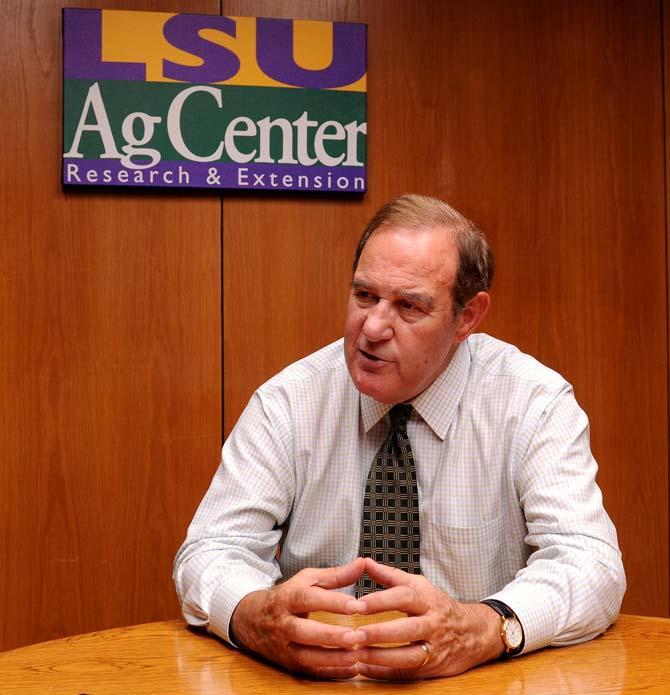After nearly half a century at the University, College of Agriculture Dean Kenneth Koonce will retire Oct. 7. His replacement is the University’s Vice President for Agriculture Bill Richardson, reuniting the LSU AgCenter’s research and extension with the college’s academic program. Those three missions have been separate since 1972, when the AgCenter was created as an autonomous campus.
The University’s Board of Supervisors merged the administrations of the College of Agriculture and the AgCenter on Sept. 6, making Richardson vice president for agriculture — leader of the 1,698-student college as well as the AgCenter, which has a presence in all 64 parishes of Louisiana.
Richardson, 68, was previously dean of the College of Agriculture from 1992 to 1997. He first came to LSU in 1984 as the director of School of Vocational Education, became associate dean of the College of Agriculture in 1986 and was named chancellor of the AgCenter in 1997.
The budget has been Richardson’s top concern at the AgCenter, which came close to declaring financial exigency in 2011. Richardson believes budget stability will continue to be a key issue because it is difficult to plan for departments’ needs with the threat of midyear budget cuts.
Richardson spent much of his first deanship countering the “plows, sows and cows” attitude toward agriculture and demonstrating that agriculture has modernized into a science- and business-based industry. That battle is still being fought, he said.
Richardson said the college needs to raise more scholarship money to compete with other universities and attract the best students to agriculture. He plans to form a council of prominent alumni and supporters to campaign for those funds.
Richardson will spend a portion of each week in his Woodin Hall office as dean even though he travels frequently on AgCenter business. It is important to be available to students, he said, because sometimes they just need guidance — “They’re extraordinarily bright or they wouldn’t be here.”
Richardson said his No. 1 accomplishment as chancellor was the AgCenter’s internal reorganization this spring that empowered him to head research and extension, which he said increased teamwork by removing “silos” that walled off one mission from the other. He is optimistic that tearing down the silo around academics when he takes over as dean Oct. 9 will yield more positive results.
“We will have going into 2014 all three parts of the land grant agriculture mission under one administrative structure,” Richardson said.
Koonce said consolidation was long overdue because the College of Agriculture’s decisions should be made in conjunction with the AgCenter.
Koonce, 74, arrived at the University in 1967 as a professor in experimental statistics, and he became head of that department in 1982. In 1989, Koonce moved to the AgCenter, where he directed its intellectual property program. He returned to the College of Agriculture as dean in 1997.
Koonce said his biggest challenge as dean has been the ongoing budget crisis because it jeopardizes the college’s ability to provide students a comprehensive education. Some classes have become larger or were dropped because budget cuts prevented replacing departed faculty members.
Despite many changes in the field during his tenure, “agriculture is everything” and is still important, Koonce said. Because agriculture touches every area of life, it is critical that students experience its diversity to find something they love and can use to serve mankind, he said.
Koonce said he made it a priority as dean to increase student involvement. Clubs in the college — such as a soil judging team — are now more active. Koonce spearheaded the creation of an undergraduate research program that today helps students develop relationships with faculty and gain agriculture experience.
Koonce oversaw the creation of several new schools in the College of Agriculture such as the School of Animal Sciences and the School of Plant, Environmental and Soil Sciences. Similar departments were merged, situating students in a broader perspective of their discipline, he said.
Koonce will remain on campus for a few months to help set up a joint, one-year analytics master’s degree program in the College of Agriculture and E.J. Ourso College of Business focusing on practical uses for statistics in the age of big data.
Koonce said he will miss working with students and their willingness to think outside of the boxes faculty members sometimes find themselves in after spending a long time in a field.
“Students don’t know what can’t be done. They don’t know what’s impossible,” he said.
“Students don’t know what can’t be done. They don’t know what’s impossible.”
Taking the Reins: Richardson to replace Koonce as dean of College of Agriculture
September 30, 2013
Vice President of Agriculture Bill Richardson serves as Dean of the College of Agriculture and the LSU AgCenter.






